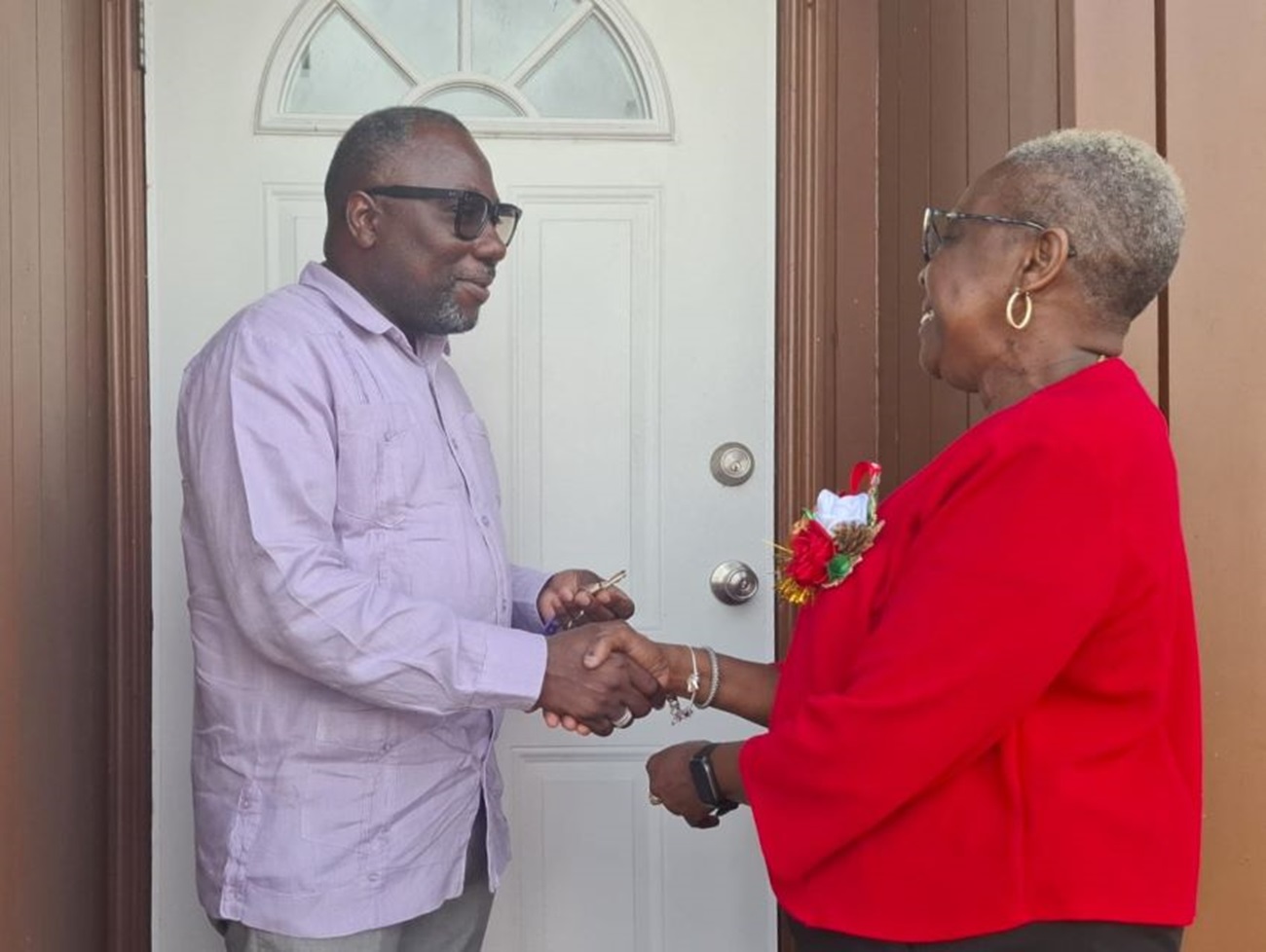Barbados, December 24, 2024 – As Government continues to fulfill its mandate of delivering innovative and climate resilient houses, the dream of home ownership for Barbadians is becoming more attainable, affordable, and accessible.
Minister of Housing, Lands and Maintenance, Dwight Sutherland, expressed this view yesterday, before handing over keys to new homeowners at Cliffden Development, St. Philip.
“We started a journey of diversifying our housing portfolio over the last two years. Yesterday, I spoke extensively at Whitepark Road, where we opened 16 Light Gauge Steel units, a project between the Government of Barbados and East West Barbados, a Chinese company formed here in this country, to provide…150 housing units.
“I am delighted this morning to hand over 11 Dura Villa hardwood houses to 11 families here at Cliffden in St. Philip. This project was a joint venture between Dura Villa out of Guyana, who manufactured these houses, and they were shipped disassembled, and we assembled them. Local contractors assembled these houses under the guidance of the Guyanese contractor, and we … provided employment for at least 20 local contractors and builders,” he stated.
venture between Dura Villa out of Guyana, who manufactured these houses, and they were shipped disassembled, and we assembled them. Local contractors assembled these houses under the guidance of the Guyanese contractor, and we … provided employment for at least 20 local contractors and builders,” he stated.
Mr. Sutherland revealed that another 27 units are also being constructed in River Crescent, St. Philip, and said that the units in those two projects (Cliffden & River Crescent) should be completed by the end of January.
Of the Cliffden Development, he expressed delight in having imported 60 hardwood Dura Villa houses, and stated that his Ministry, along with the National Housing Corporation, had not just built the houses but had also provided the opportunity for persons who already had land to purchase these houses.
“…In an effort to push home ownership… affordable and resilient housing to the average Barbadian, we’re not only building the houses within the joint partnership between Dura Villa and National Housing, but also those persons who can afford a house and they have their own land.
“Ownership is the essence of the Barbadian dream; something that every Barbadian carries in his or her heart to own a home, and it is even more special when you move into your home at Christmas and during the festive season. And I know that is some extra pleasure, extra joy to these 11 families at Cliffden,” he remarked.
Minister Sutherland revealed that upon completion of the houses at River Crescent, 89 houses are expected to come to the island from Dura Villa, under a ‘turnkey project’, located at Dodds North, Concordia Gardens, just “a stone’s throw away” from Cliffden.
“So that is 11 plus 89, that’s 100 and 30, 130 houses before the end of the financial year. We should have, not all installed, but we should have purchased 130 houses. Our aim is to have 350 Dura Villa houses in this country before the end of the financial year, before the end of 2025, that is our aim,” he stated.
When asked about concerns regarding the close proximity of Concordia Gardens to Dodds Prison, Minister Sutherland stressed that the prison was built in a community surrounded by houses.
“The prison would’ve been built and [we would have] taken care of all of the safety measures in terms of land space, where their barriers are [and the] fencing is. And … as you drive going to the north of the prison, when you enter Church Village, what do you have next to the prison? You have houses. If you go to the Bushy Park racing section, what do you have next to the prison? Houses… if you go to Padmore Village, and I know the district very well… you have houses,” he explained.
The Housing Minister emphasised that safety measures were taken into consideration before the land was acquired for housing and had been studied and discussed in collaboration with his Ministry, the head of the prison, the permanent secretaries of the Ministries of Housing and Home Affairs, and Minister of Home Affairs.
He stressed that although Concordia is located across the road from the prison, a 20-foot buffer had been created and plants and hedges will serve the dual purpose of beautifying the area while acting as a safety precaution.
One of the homeowners, Sonia Gill, was ecstatic about having her own home on a ‘piece of the rock’. “It means a lot…. It is a blessing…. I said, but God, but God…. I can’t express the feeling and the joy of owning a piece of this rock,” she shared.


 News1 week ago
News1 week ago
 Caribbean News1 week ago
Caribbean News1 week ago
 News1 week ago
News1 week ago













